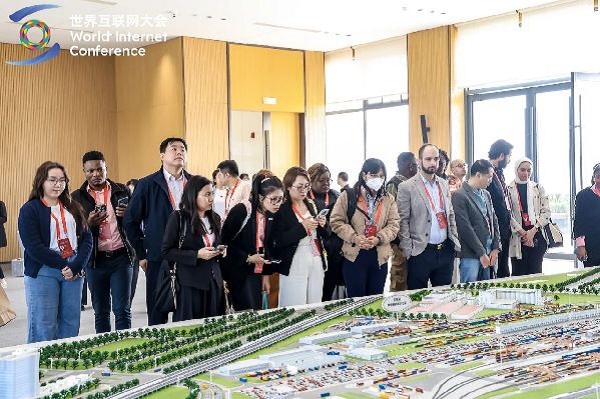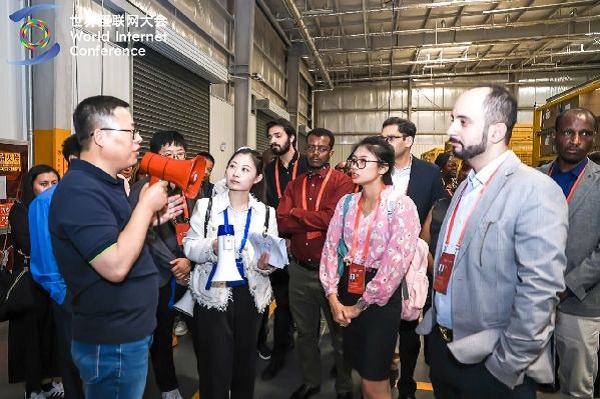
- Home
- Media Center
- Events
- Membership
- Digital Academy
-
Reports
- Collection of cases on Jointly Building a Community with a Shared Future in Cyberspace
- Collection of Shortlisted Achievements of World Internet Conference Awards for Pioneering Science and Technology
- Reports on Cross — Border Ecommerce
- Reports on Artificial Intelligence
- Reports on Data
- Series on Sovereignty in Cyberspace Theory and Practice
- Other Achievements
- About WIC
- 中文 | EN

WIC cross-border e-commerce training builds bridge for digital Silk Road
The World Internet Conference (WIC) Digital Silk Road Development Forum was held in Xi'an, Northwest China's Shaanxi province, on April 16, with the WIC Digital Silk Road Cross-Border E-Commerce Training taking place concurrently. The training program brought together participants from 27 countries around the world.

Participants of the World Internet Conference Digital Silk Road Cross-Border E-Commerce Training take a group photo. [Photo/wicinternet.org]
The Digital Silk Road symbolizes a historical path for promoting trade and cultural exchanges, and it now brings new possibilities for creating economic growth and mutual benefits in the digital world, said Binyam Fikru Kebede, a participant from Ethiopia.
Alphos Chigwadhi from Zimbabwe noted that the Digital Silk Road has played a significant role in promoting connectivity and trade, while also improving logistics services, which are crucial in trade exchanges.
The curriculum of the training focused on key issues in cross-border e-commerce, including global development trends, policies and regulations, successful experiences from comprehensive pilot zones, infrastructure development, cross-border service processes, and smart logistics.
During the training, participants attended the Digital Silk Road Development Forum and visited the Xi'an port for the Chang'an China-Europe freight trains, the Xi'an comprehensive bonded zone cross-border e-commerce export consolidation center, and the Cainiao Xi'an Non-Air Transit Center for on-site learning.

At the Xi'an port for the Chang'an China-Europe freight trains, participants learned how the Chang'an China-Europe freight train is continuously expanding its routes, improving one-stop international transport services, and enhancing transport efficiency through wide-track direct routes and sea-rail intermodal transport.
At the Chanba International Port of Xi'an, participants learned about the city's cross-border e-commerce industry development, where policies are put into full use to transform the "traffic" from the China-Europe Railway Express into long-term trade.
At the Cainiao Xi'an Non-Air Transit Center, participants observed a new transport model that simplifies customs procedures, accelerates turnover speed, and offers high cost-effectiveness and flexibility, and gained a broader perspective on modern logistics in cross-border e-commerce.

Lidiya Tadesse Adela, a participant from Ethiopia, said that the Digital Silk Road Development Forum is conducive to promoting economic development, business connections, and strengthening ties between nations. "I have high expectations for this forum, as my country is developing related industries, with more than 400 e-commerce projects related to the Belt and Road Initiative in Ethiopia," she said.
Patist Panichewa from Thailand discussed the development of the e-commerce market in his country, saying that the e-commerce sector has attracted significant foreign investment, with many overseas brands establishing e-commerce markets there. Although the competition is intense, there is still vast potential in Thailand's domestic market, making it an attractive sector for many, he said.
In recent years, global cross-border e-commerce has experienced rapid growth, becoming a new highlight of global economic development, thanks to the efforts of government agencies and international organizations.
Zhao Quan, senior project officer at the United Nations International Trade Centre, emphasized that the key of building the Digital Silk Road is to jointly promote international cooperation, increase communication, and foster collaboration. Zhao believed that this training program has provided a valuable platform for professionals from different countries and sectors to exchange ideas.
"The Silk Road e-commerce is not only about trade connectivity but also about creating mutual understanding. Through this training program, we hope to cultivate high-level professionals in Silk Road e-commerce," said Xue Hong, member of the UN Network of Experts for Paperless Trade in Asia and the Pacific and the APEC E-commerce Business Alliance Expert Committee, as well as professor at Beijing Normal University's Law School.

The World Internet Conference (WIC) was established as an international organization on July 12, 2022, headquartered in Beijing, China. It was jointly initiated by Global System for Mobile Communication Association (GSMA), National Computer Network Emergency Response Technical Team/Coordination Center of China (CNCERT), China Internet Network Information Center (CNNIC), Alibaba Group, Tencent, and Zhijiang Lab.





